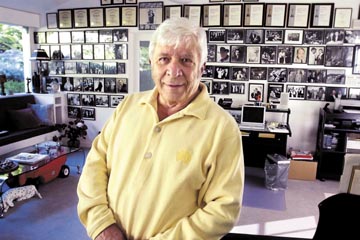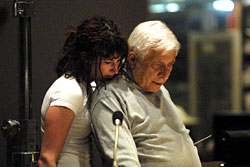Heartfelt Emotions Inspire Heavenly Music
Story Guides Elmer Bernstein when he Scores Films
Tom Jacobs | Santa Barbara News-Press
Elmer Bernstein never watched Douglas Sirk’s movies in the 1950s. To him, such “women’s weepies” were of little interest. Besides, he was too busy writing the scores to edgier, more provocative films such as “The Sweet Smell of Success” and “The Man With the Golden Arm.”
A half-century later, Hollywood movies have not only lost their edge; they’ve also lost their humanity. Most of today’s mainstream films are “more about sensation than emotion,” in the words of the veteran film composer. Character-driven dramas, such as “To Kill A Mockingbird” and “Hud” (both of which he scored), are increasingly rare. Thus Bernstein was delighted to discover Todd Haynes’ 1950s-style melodrama “Far From Heaven.” Here was a breath of fresh, cool air straight out of a New England autumn. “I think the great reception the film has received has got to do with a hunger for heartfelt, straightforward storytelling,” said Bernstein, who wrote the movie’s delicate, subtle score. “I think there has been an infection in filmmaking—an infection of cynicism and heartlessness. We don’t deal with real emotions (in today’s Hollywood movies). That has also affected film scoring, because you have to score the film you’re seeing.”
In its own stylized (some would say deliberately artificial) way, “Far From Heaven” tells a turbulent story of thwarted passion—between a woman and her closeted-homosexual husband, and between that same woman and her black gardener. Bernstein called it “beautiful and very winning.”
The same adjectives have been applied to his score, which has just earned him a Golden Globe nomination and an award from the Los Angeles Film Critics Circle. It will very likely earn Bernstein his 14th Academy Award nomination (he has won once, for 1967’s “Thoroughly Modern Millie”). If so, it will mean he has been nominated for an Oscar in six consecutive decades, from the 1950s to the 2000s.
While he is tickled by that notion, success does not seem to have gone to Bernstein’s head. During a lengthy interview in his studio (located next to his home, located high up in the Santa Barbara foothills) the still-energetic 80-year-old was relaxed, unpretentious—and extremely articulate about his chosen art form.
 “Music is that art which begins where pictures and words leave off,” he said. “That’s why it’s such a brilliant adjunct in filmmaking. It expresses something that is implicit, but not explicit.”
“Music is that art which begins where pictures and words leave off,” he said. “That’s why it’s such a brilliant adjunct in filmmaking. It expresses something that is implicit, but not explicit.”
That is particularly true of “Far From Heaven,” a film in which the characters often must keep their true feelings hidden in order to conform to the conventions of their society. Often, it is Bernstein’s music that speaks most eloquently about what is going on inside their hearts.
“I was scared to death the whole time I was working on this film,” Bernstein said. “I thought to myself, ‘This is dangerous territory. This film is on a cliff edge.’ A bad score could have made this film funny. You wouldn’t have believed a word anyone said. “That had a lot to do with my choice of starting simply, with just the piano. I had to exercise a certain kind of restraint.”
Bernstein’s less-is-more approach also meant leaving many of scenes without music. “People have a general impression there’s a lot of music in the film,” he said. “There isn’t as much music as people think. The music is never there unless there is something important for it to do. I think that’s why people become aware of it.
“I think silence is, very often, as eloquent as music. Take the scene after (Julianne Moore’s character goes to her husband’s office and finds him kissing a man). We cut to the house when he walks in (later that evening). They are unable to talk to each other. The first thing she talks about is an estimate they got on the roof.
“There’s no music at all,” Bernstein noted. “The silence is much more telling. It is a bleak moment. To load that with music would hurt the very bleakness she is feeling.” Starting “Far From Heaven” with a piano solo was a natural for Bernstein, who began his career as a concert pianist. (He considered performing the piece himself on the soundtrack, but ultimately gave the job to colleague Cynthia Millar.) Born in April 1922, in New York City, he briefly studied painting before turning to music. When he was 12, his piano teacher introduced him to Aaron Copland, who arranged for him to take composition lessons and became a mentor.
During World War II, Bernstein served in the Special Services branch of the Army, creating music for patriotic radio programs. “I was imported by somebody I met in basic training, a writer named Millard Lampell, who was writing scripts for these propaganda broadcasts for the home front,” he recalled. “They decided they wanted to include American folk songs in the show as a bit of Americana. He remembered that I knew something about American folk music. So I was imported to orchestrate these songs. People like Burl Ives and Woody Guthrie would come on the show and sing these songs with orchestral backing.
“That’s what I was doing when the fellow who wrote the music for the dramatic portions of the show went AWOL. They had to do a show the next day. The head of the music program called me into his office and said, ‘Can you do this?’ I said, ‘Sure,’ although I had no idea what I was doing. He gave me the script and told me where they needed music.
“We were stationed at Yale University in New Haven (Conn.). They stuck me in the engineering department, where they had a piano. I had to do this overnight, since it had to be rehearsed the next day. That’s how (my composing career) started. I thought to myself, ‘This is really amazing! You write the stuff, these great musicians play it and millions of people hear it!’ I thought it was wonderful.”

Bernstein’s daughter Emilie orchestrates his scores.
After his discharge, Bernstein worked as a concert pianist, performing on the East Coast. But he didn’t particularly enjoy it. “Practicing the piano five hours a day felt like drudge work,” he recalled. “Also, I had this vision of myself playing the same stuff in 50 years. That did not appeal to me.”
Fortunately, his friend Millard Lampell again intervened. He wrote a script for a radio show and got Bernstein to write the music. He then talked Columbia Pictures into letting the fledgling composer score the film they made from his novel “The Hero.”
“Saturday’s Hero,” as it was renamed, was released in 1951. Bernstein moved to California to score it, and he never went back. He and his family (his wife and four children, including his daughter Emilile who orchestrates his scores) spent several years living on a ranch in Malibu before moving to Santa Barbara in 1977.
On one wall of Bernstein’s studio is an amazing array of photographs documenting his career. There are shots of Bernstein with fellow composer Leonard Bernstein (no relation), Gregory Peck, Nat King Cole, Julie Andrews and countless directors—including Martin Scorsese, for whom he scored “The Age of Innocence” in 1993.
Film music scholars credit Bernstein with being one of the first to bring a distinctly American style to his scores. His predecessors, and many of his colleagues, wrote in a European tradition that was heavily influenced by such late-Romantic-era composers as Richard Strauss. Bernstein’s music, in contrast, contains echoes of jazz halls and Copland’s ballets.
“I didn’t do what I did self-consciously,” he said. “My teachers were Copland and Roger Sessions—American composers. Those are the people I was brought up with.”
Asked if there was any resistance to his unorthodox approach, he replied, “Not really. Curiously enough, the (creative) atmosphere was much freer when I started. In the studio system, your boss was always a musician. You were working for the head of the music department. In the highly compartmentalized studio system, it was assumed that cinematographers knew how to photograph a film, directors knew how to direct it, and composers knew how to write music.
“The only time I had a concern was when I got the idea of doing a jazz score for ‘The Man With the Golden Arm.’ I went to Otto Preminger and said, ‘I have an idea I ought to tell you about before I do it. This is a film about a guy who wants to be a jazz drummer. I have an idea that this should be a jazz-dominated score.’ Otto looked at me and said, ‘If that’s what you think you ought to do, then do it.’ That doesn’t happen today.”
Since finishing “Far From Heaven,” Bernstein has turned down a couple of film projects. “I got into a really nice place doing that film, and I kind of want to stay there,” he said. He has been spending more time on concert music in recent years; once the holidays are over, he intends to resume work on his half-finished string quartet. After a couple of months without composing, “I’m itching to do something,” he said with a smile. No matter what he is writing, Bernstein finds it helps to ask himself some fundamental questions before he sits down at the keyboard.
“I try to develop at least an attitude about where I want to go,” he said. “What do I want the music to do? What do I want the audience to feel when they hear this? Music is about feeling.”
Which brings us back to “Far From Heaven.” Many people have assumed that, given the film’s period look and feel, Bernstein set out to write a 1950s-style score. Not true, he insisted. His inspiration, as always, came from the characters and their deeply felt desires.
“My only concern was: What can the music do to inform us of their emotions?” he said. “If this had been the same story set today, I would have scored it the same way.”
Reprint Courtesy of Santa Barbara News-Press
